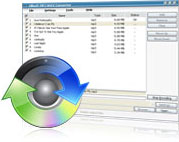
Defined within the RIFF specifications is an INFO List chunk, designed to hold various specific metadata elements.

The RIFF format allows for nested chunks. Transparency of subtypes is determined by the encoding of the wrapped content. Available online, e.g., at Ĭertain subtypes are widely adopted. IBM Corporation and Microsoft Corporation, August 1991.

Multimedia Programming Interface and Data Specifications 1.0. Proprietary format developed by Microsoft and IBM for Windows 3.1. See WAVE_LPCM, AVI, and RMID.įully documented. LC has experience with some RIFF subtypes. The RIFF structure is the basis for a few important file formats, but has not been used as the wrapper structure for any file formats developed since the mid 1990s. Applications that play or render RIFF files may ignore chunks with labels they do not recognize.

The basic chunk is a RIFF chunk, which must start with a second four-character code, a label that identifies the particular RIFF "form" or subtype.
:max_bytes(150000):strip_icc()/wav-files-586fbbd35f9b584db30f80cd.png)
Chunks are identified by four-character codes and an application such as a viewer will skip chunks with codes it does not recognize. The basic building block of a RIFF file is called a chunk. Strictly speaking, RIFF is not a file format, but a file structure that defines a class of more specific file formats, some of which are listed here as subtypes. I believe that it is the type of A.RIFF (Resource Interchange File Format) is a tagged file structure for multimedia resource files. I can't play them, and would like to convert them to some modern, playable format. wav files from a Palm Pilot or possibly an old Windows Pocket PC that are in the format of a.


 0 kommentar(er)
0 kommentar(er)
